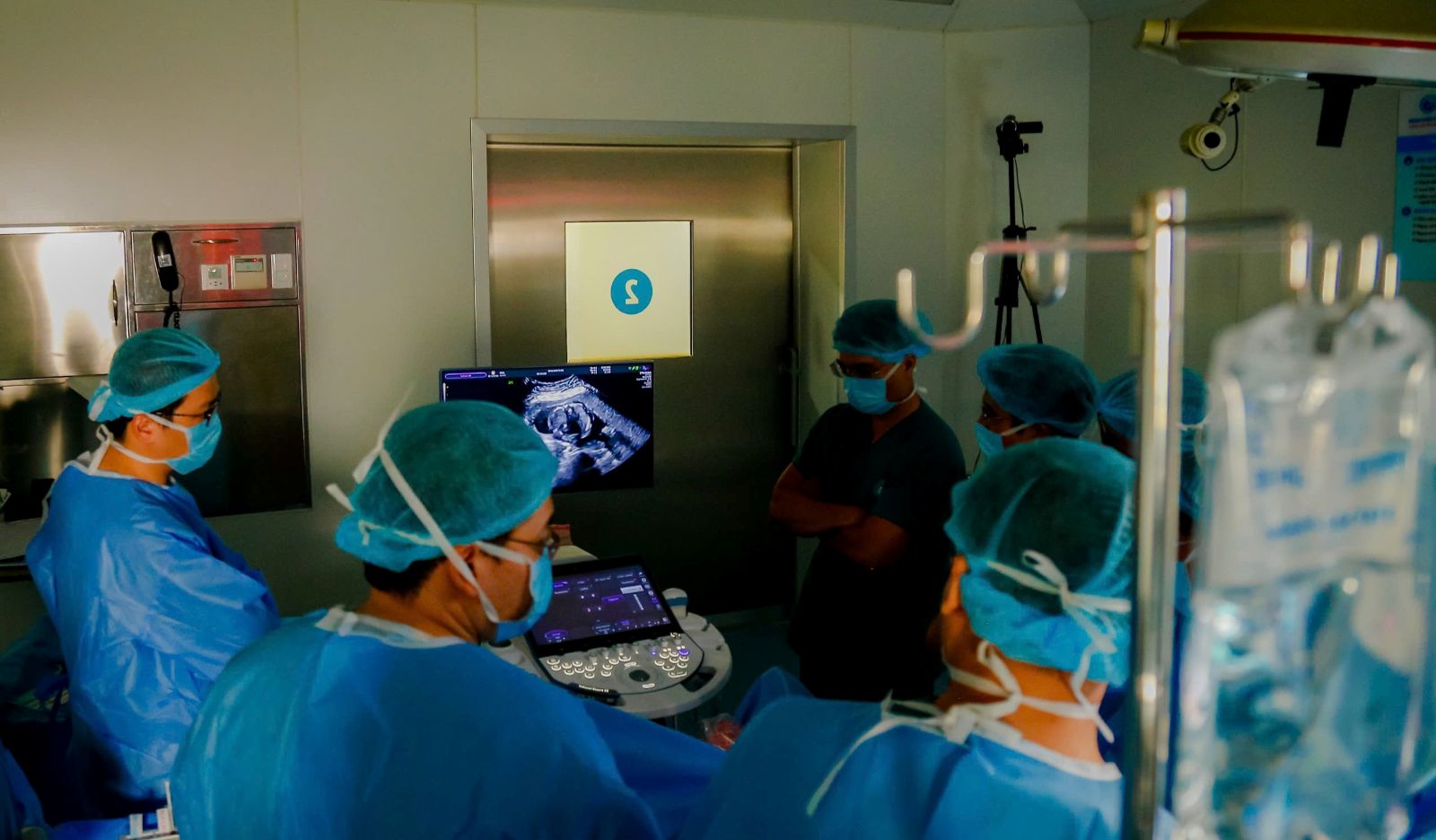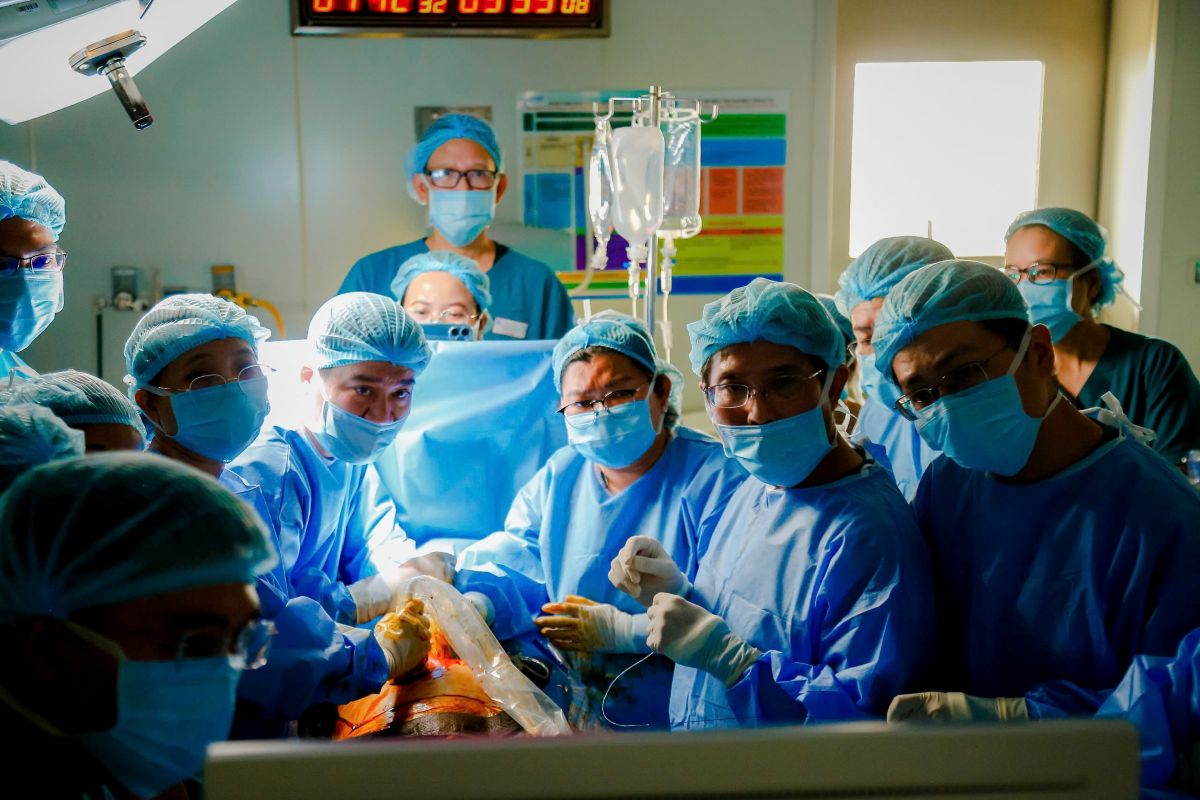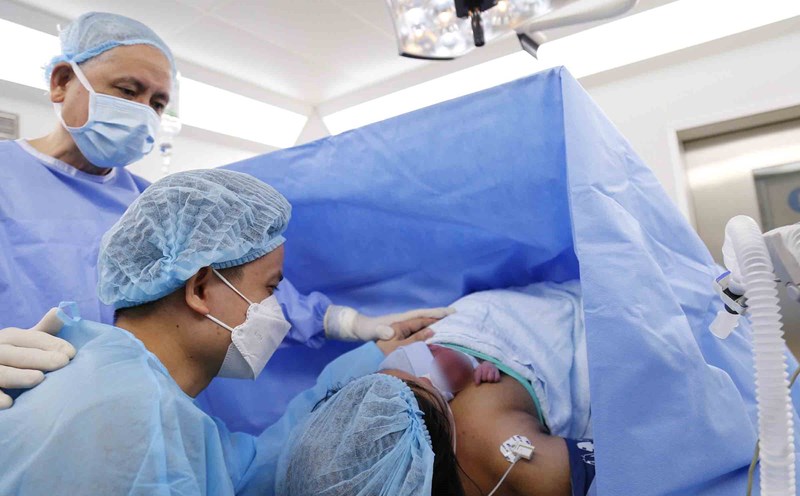As reported by Lao Dong Newspaper, the team of Tu Du Hospital and Children's Hospital 1 has just successfully intervened in a case of complex congenital heart disease in a 22-week fetus of a Singaporean mother.
This is the 9th fetal heart intervention performed in Ho Chi Minh City, also the most difficult case to date. Because the fetus is still very small, weighing about 600 grams, and is in a particularly serious medical condition.
Shortness of breath, 2 interventions
Tu Du Hospital informed that this 41-year-old pregnant woman is pregnant for the first time in more than 10 years, thanks to in vitro fertilization (IVF). From the 18th week, the fetus was discovered to have abnormal cardiovascular pathways. The situation is getting worse.
Doctors at KK Women's and Children's Hospital (Singapore) assessed the fetus as having a high risk of death in the uterus and introduced the patient to Ho Chi Minh City for treatment.
Tu Du Hospital, Children's Hospital 1 and international experts from Italy and Australia organized an inter-hospital consultation to assess the possibility of intervention. This is not just a professional exchange but a decision to survive. After more than 2 hours of discussion, the team agreed to perform a mastectomy in the uterus, although the success rate was only about 60% and there was a great risk. The team performed the first intervention on May 22, but was unsuccessful due to a fixed placental position.
Associate Professor, Dr. Tang Chi Thuong - Director of the Ho Chi Minh City Department of Health decided to temporarily suspend the intervention and plan to do a second time when conditions are more favorable. The first intervention failed but no one gave up.

On May 28, the second intervention consultation took place. Experts decided to intervene again, trying to save the fetal heart as the disease was getting worse.
The first challenge is to turn the fetus from a cluster position, at least 120 degrees - an extremely risky operation. Just a few degrees of deviation, or rotation too fast, the umbilical cord can rotate, the fetal heart can stop beating.
A special labor Object was placed in the urethra by the doctor. Doctors rotate the thighs, shoulders, and chest of the fetus clockwise, until the fetal heart is in the optimal position.
With quick and precise operations, the intervention team used a specialized needle to penetrate the mother's abdomen, passing through the uterine - bicep layers, penetrating the fetal chest, pointing straight into the left left left amniotic cavity, into a narrow place as small as a pencil. The fetal heart began to slow down, and the whole team had no time to hesitate.
Cardiologists quickly coordinated to insert a guidewire cable, putting the ball in the correct position of the aorta, pump - nong - withdraw. All of this was concentrated for a few seconds under the high concentration of the entire team.
Fertilizer drugs were used immediately afterwards. The fetal heart increased again to 141 times/minute, on the doppler the blood flow was strongly reversed through the aorta valve.
The whole crew burst into tears, and all the interventions were successful. The baby won. Both the mother and her family burst into tears with emotion.
Stepping forward in fetal medicine, an opportunity to attract foreigners to Vietnam for treatment
From the success of this intervention, Tu Du Hospital affirmed that this is not only an important step forward in medicine but also affirmed the development aspiration of Vietnamese medicine.
From now on, Vietnamese patients no longer have to go abroad for treatment. Because the team of doctors in Ho Chi Minh City is capable and dedicated to performing fetal heart interventions on the spot.
At the same time, it marked a new turning point in thai medicine in Vietnam, not only treating diseases domestically, but also becoming a destination for foreign patients.

The Ho Chi Minh City Department of Health assessed a leading hospital in Singapore that proactively introduces patients to Ho Chi Minh City for treatment not only as a belief in its professional capacity but also as a recognition by the ASEAN region for its high technical expertise in the field of obstetrics and gynecology in Vietnam.
This is an important milestone in the development journey of fetal medicine and specialized medicine in Ho Chi Minh City. At the same time, it affirmed its determination to develop into a specialized medical center in Southeast Asia of the Ho Chi Minh City health sector.











